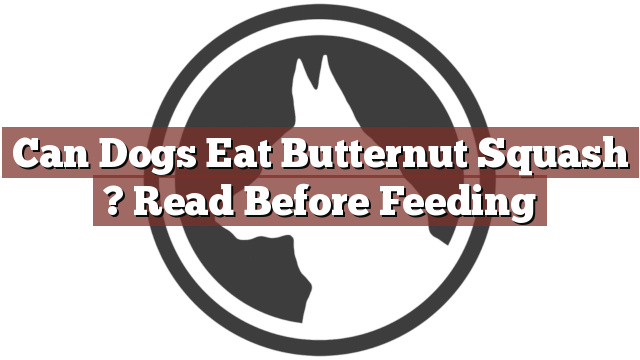Understanding Your Dog’s Dietary Needs
As a responsible pet owner, it is important to understand your dog’s dietary needs. Providing a well-balanced and nutritious diet is crucial for their overall health and well-being. While dogs are omnivorous and can consume a variety of foods, not everything that is safe for humans to eat is suitable for our furry friends. It is essential to be aware of what foods are safe and beneficial for our canine companions and which ones should be avoided.
Can Dogs Eat Butternut Squash? Read Before Feeding
Can dogs eat butternut squash? Yes, dogs can safely consume butternut squash in moderate amounts. This versatile vegetable is packed with essential nutrients such as vitamins A, C, and E, as well as dietary fiber. These nutrients can promote a strong immune system, improve digestion, and contribute to a shiny coat. However, it is important to prepare and serve butternut squash properly to ensure it is safe for your dog to eat.
Pros and Cons of Feeding Butternut Squash to Your Dog
Feeding butternut squash to your dog can have several benefits. The high fiber content aids in digestion, preventing constipation and promoting a healthy digestive system. The vitamins and antioxidants found in butternut squash can also support a strong immune system, reducing the risk of illness in your furry friend. Additionally, the low calorie and fat content of butternut squash make it a great option for dogs that need to shed a few pounds.
However, there are a few things to consider before adding butternut squash to your dog’s diet. Some dogs may experience digestive upset or diarrhea if they consume too much squash. It is important to introduce it gradually and in small portions to monitor your dog’s reaction. Additionally, always remove the seeds and skin before serving, as they can present a choking hazard or cause digestive issues. Lastly, if your dog has any underlying health conditions or is on a specialized diet, it is best to consult with your veterinarian before introducing butternut squash.
Conclusion: Considerations for Feeding Butternut Squash to Your Dog
In conclusion, while dogs can eat butternut squash, it should be given in moderation and prepared properly. Incorporating this nutritious vegetable into your dog’s diet can provide them with vitamins, fiber, and antioxidants. However, it is crucial to introduce it gradually, remove the seeds and skin, and monitor your dog for any adverse reactions. As always, if you have any concerns or questions about your dog’s diet, it is recommended to consult with your veterinarian for personalized advice.
Thank you for taking the time to read through our exploration of [page_title]. As every dog lover knows, our furry friends have unique dietary needs and responses, often varying from one canine to another. This is why it's paramount to approach any changes in their diet with caution and knowledge.
Before introducing any new treats or making alterations to your dog's diet based on our insights, it's crucial to consult with a veterinarian about [page_title]. Their expertise ensures that the choices you make are well-suited to your particular pet's health and well-being.
Even seemingly harmless foods can sometimes lead to allergic reactions or digestive issues, which is why monitoring your dog after introducing any new food item is essential.
The content provided here on [page_title] is crafted with care, thorough research, and a genuine love for dogs. Nevertheless, it serves as a general guideline and should not be considered a substitute for professional veterinary advice.
Always prioritize the expert insights of your veterinarian, and remember that the health and happiness of your furry companion come first.
May your journey with your pet continue to be filled with joy, love, and safe culinary adventures. Happy reading, and even happier snacking for your canine friend!

